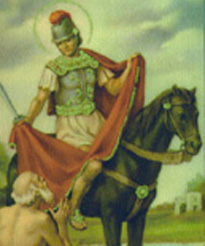Saint of the Day Online - St Martin of Tours
Saint of the day online, Saturday, November 11, 2017
11-11-2017
Saint Name: St. Martin of Tours
Place: Hungary
Birth: 316 or 336 AD
Death: November 8, 397
Feast: November 11
Saint Martin of Tours who was born on 336 was Bishop of Tours, whose shrine in France became a famous stopping-point for pilgrims on the road to Santiago de Compostela in Spain.
He has become one of the most familiar and recognizable Christian saints, sometimes venerated as a military saint. As he was born in what is now Szombathely, Hungary, spent much of his childhood in Pavia, Italy, and lived most of his adult life in France, he is considered a spiritual bridge across Europe.
Just before Martin was born, Christianity was legalized in the Roman Empire and the bloody persecution of Christians soon came to an end. It was not the official religion of the State, but it could be practiced and proclaimed openly. The Gospel message soon flourished in ancient Rome, transforming the empire. Martin's parents were pagans, but at the age of 10, Martin chose to respond to the call of the Gospel and become a Christian.
At the age of fifteen, Martin was required to follow his father into the cavalry corps of the Roman military. By the time he was 18, Martin is believed to have served in Gaul, and also eventually Milan and Treves. Scholars think he served as part of the emperor's guard.
As a young soldier, Martin encountered a beggar in Amiens. The beggar was unclothed and it was very cold. Martin removed his cloak and with his sword, he cut it in half. He gave this half to the beggar and dressed himself in the remnant. That night, Martin had a vision in which Christ appeared to him. The vision spoke to him, "Martin, a mere catechumen has clothed me." A catechumen is one who is being instructed in the Christian faith. In the early centuries of Christianity, that was a long process of instruction - and Martin was deeply dedicated to it.
In 371, the city of Tours needed a new bishop and the people decided to call Martin to the office. Martin did not want the job so the people decided to trick him into the office. The people insisted he was needed to administer to someone sick, so he came out as quickly as he could. He did not even bother to improve his appearance. When he learned it was a trick to make him a bishop, Martin actually tried to hide. He was quickly discovered and the people called him forward to be ordained to the office of Bishop. Even though he did not really want the office, he was ordained - and he became a holy and hardworking Bishop.
As a Bishop Martin established a system of parishes to manage his diocese. He made a point to visit each parish at least once per year. In addition to his appointed rounds, Martin combated paganism, particularly the Druid religion which was still prevalent at the time. He passionately and faithfully proclaimed the Gospel of Jesus Christ and won many to the Christian faith.
Yet, he longed for more prayer and wanted to pursue a monastic life. In the year 372 Martin established an abbey at Marmoutier so he could retreat there and live as a monk with the many disciples he had attracted.
In the following years, a heresy broke out in the church. An aesthetic sect called the Priscillianists after their leader, Priscillian, had developed in Spain and Gaul. The First Council of Saragossa condemned the heresy, but the Priscillians did not change they practices. This prompted one bishop, Ithacius of Ossonoba to petition the Roman Emperor Magnus Maximus to put him to death. Martin was opposed to the sentence of death, and was joined by Bishop Ambrose of Milan in his opposition. Martin traveled to Trier where the Emperor held court. Martin was able to persuade the Emperor to refrain from putting Priscillian and his followers to death. However, after Martin left, Ithacius persuaded the Emperor to change his mind again and Priscillian and his followers were executed in 385.
Martin was so upset by Ithacius, he refused to communicate with his fellow bishop until the Emperor pressured him to resume communicating with his colleague.
Martin died in Candes-Saint-Martin, Gaul in 397.